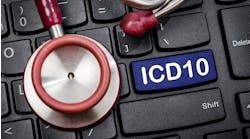Navicure, today announced the results of its second ICD-10 Readiness Survey, deployed in late 2013 in conjunction with Porter Research. The results revealed physician practices are generally still behind schedule in terms of preparation for the significant regulatory change on October 1, 2014. The survey results also indicated practices have a general sense of optimism about their readiness despite lack of know-how, communication from vendors or action taken to prepare for the transition.
A variety of personnel was represented in the survey respondent group, which was a follow-up to a survey conducted by the organizations in April 2013, including practice administrators, billing managers, practice executives and billers. Sixty percent of respondents represented practices with one to 10 providers. The research focused on revenue cycle management aspects of the ICD-10 transition, along with preparation progress, resource availability and technology readiness.
Although 74 percent of those surveyed have still not started implementing their ICD-10 transition plan, most are confident they will be prepared by the deadline. Additionally, most respondents do not anticipate any disruptions from their electronic health record, practice management system or clearinghouse vendors, yet many have claimed they have not received adequate communication from their vendors thus far.
An alarming result of the survey was the low concern of impact to budgets or productivity among respondents. While almost two-thirds of survey respondents anticipate cash flow being interrupted, far fewer anticipate a similar impact to staff productivity. Other key findings from the survey include:
- Among those practices that have not yet begun preparing for ICD-10, 86 percent anticipate starting by May 2014. In addition, 27 percent are unsure of how or where to start preparing for the transition, while 22 percent claim they do not have the time, staff or resources available to begin preparing.
- The overwhelming majority (87 percent) of practices considered themselves “very confident,” “confident” or “somewhat confident” they would be prepared by October 1, 2014.
- Respondents see training as being the most challenging (43 percent) area of the ICD-10 transition, followed by payers’ lack of preparedness, resulting in delayed payment (35 percent).
“We are pleased to see some progress in practices’ ICD-10 preparations,” shared Ken Bradley, vice president of strategic planning at Navicure. “The survey results demonstrate the critical need for immediate action by all practices, whether or not their transition plans are already underway. With less than a year until the implementation deadline, the time is now for investment in proper planning, training, education, and technology testing and upgrades.”
Navicure has planned to conduct two more follow-up surveys this year, in advance of the implementation deadline on October 1, 2014. To view the complete, current survey results and analysis, visit www.navicure.com/surveytwo.

